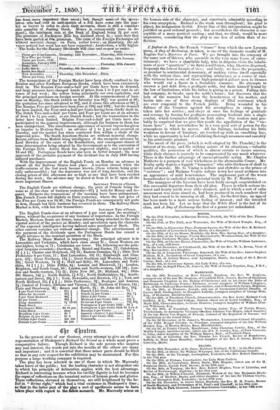.L'Enfinet de Paris, the French " drame" from which the new
Lyceum piece, A Day opteekoning, is taken, is one of the dramatic results of M. Eugene Sue's Hysti-res de Paris. We are brought into the company of the same sort of thieves, who assemble in the very same house of enter- tainment; we have a ch44itplie lady., who in disguise visits the inhabi- tants of poor " quartiersr ;!Welitivd a mibknian, who, likewise disguised, frequents the-lowest haunts of vice ; and lastly, we have the propensity, so peculiar to sentimental democracy, of making virtue dwell especially with the artisan class, and representing aristocracy as a source of vice. The virtuous hero is one of those high-principled gallant men in blouses who would cut a figure in a Socialistic romance. Ho attempts to recover a just debt from a profligate noble, but finds himself bound by the law of limitations, while his father is pining in a prison. Falling into bad company, he breaks open the noble's house ; but discovers that the lady of the mansion has been the benefactress of his mother, and bursts into one of those strong displays of filial sentiment which are ever congenial to the French public. Being wounded in his defence of the Countess against his accomplices in crime, ho is taken into her service ; and obeys at once his feelings of gratitude and revenge by forcing her profligate persecuting husband into a single combat, which terminates fatally on both sides. Our readers may pro- bably be surprised that we give this youth the appellation of the "vir- tuous hero" ; but nevertheless he is a very good sort of person for the atmosphere in which he moves. All his failings, including his little weakness in favour of burglary, are touched up with an ennobling hue, while no opportunity is lost of exhibiting thorough meanness and rascality in his aristocratic pendant.
The merit of the piece, (which is well adapted by Mr. Planche,) is the interest of its story, and the striking nature of its situations,—valuable qualities, the possession of which is almost certain to insure success, while their absence is scarcely to be compensated by any merit whatever. There is the further advantage of unexceptionable acting. Mr. Charles Mathews is a paragon of cool wickedness as the abominable Count ; Mr. Roxby aptly depicts a foppish " banquier," who adds thickness of skull to laxity of morals ; Mr. G. Vining is gallant and chivalric as the prince of " ouvriers " ; and Madame Vestria softens down her usual archness into an appearance of mild benevolence. The unpleasant part of the worst housebreaker is embodied with pictorial truth by Mr. F. Matthews.
The managers of the Lyceum have been fairly enough congratulated on this successful departure from their old plan. Pieces in which serious in- terest and hearty mirth were alike shunned, and in which a sort of calm amusement was alone aimed at, had been produced in such numbers that they had ceased to be amusing at all. Here, for the first time, an appeal has been made to a more serious feeling of interest ; and the intended mark has been hit. Let us hope that the White Hood is the last of its class, and A Day of Reckoning the first of a genus yet unhacknied.
























 Previous page
Previous page